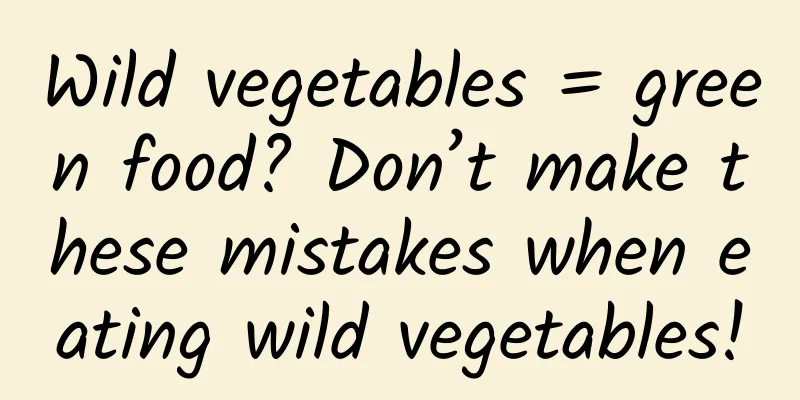Should you avoid eating mutton, seafood, tofu and other "irritating foods" when you are injured? The answer is surprising

|
Author: Zhang Yu, Researcher, Institute of Nutrition and Health, Chinese Center for Disease Control and Prevention Reviewer: Song Shuang, Associate Researcher, Institute of Nutrition and Health, Chinese Center for Disease Control and Prevention gossip After an injury, you always want to take good care of yourself so that your body can recover faster. However, there are many sayings that you should avoid certain foods after an injury, which makes people worry about "post-injury diet". Elderly people often say that if you eat "irritating foods" after an injury, the wound will not heal and may even fester, such as seafood, beef, mutton, and even tofu. Regardless of whether it is true or not, there are many people who firmly believe it. Copyrighted stock images, no reproduction is authorized So, will eating these foods after an injury really prevent the wound from healing? analyze There is no sufficient evidence for the "trigger food" theory The topic of avoiding eating "irritating foods" after being injured has been mentioned from ancient times to the present and is widely circulated among the people. There is a saying that foods such as mutton are called "irritating foods". These "irritating foods" will prevent wounds from healing, and therefore become a dietary taboo. This is not the case. According to existing records, the so-called "irritating foods" mostly refer to foods that are irritating and can easily induce certain diseases or aggravate existing diseases. Some people believe that spicy condiments such as garlic and chili peppers are irritating foods, while others believe that fish and shrimp are irritating foods, and some believe that mutton and beef are irritating foods. In fact, there is not enough evidence to support the theory of "irritating foods", and the taboos on seafood, beef and mutton are only spread among the people. There is no relevant record in classical medical books, clinical medicine or nutrition, and there is no report that eating mutton will affect wound healing. Copyrighted stock images, no reproduction is authorized The healing process after a physical injury is relatively complicated and is affected by multiple factors. It can be roughly divided into two aspects: internal and external factors. The internal cause is mainly physical health. If the body itself is malnourished, has certain metabolic diseases, or lacks immunity due to protein deficiency, it will affect the wound healing process and even lead to a poor prognosis. External factors include more, among which infections caused by pathogens and foreign bodies in wounds have the greatest impact, but foods such as seafood are not among the external factors. High-quality protein helps wound healing Contrary to rumors, modern medicine believes that trauma patients, as a special group of people, need to consume more protein during the wound healing process. Properly increasing the intake of high-quality protein will help improve the body's self-healing ability. In clinical practice, it is also recommended that trauma or postoperative patients should appropriately increase the proportion of high-quality protein in their diet. As for the specific issues about seafood, beef, mutton and tofu, let's discuss them one by one. ▶ About seafood Seafood is rich in high-quality protein, so it is beneficial for wound healing. In addition, some deep-sea fish are also rich in long-chain polyunsaturated fatty acids (such as EPA and DHA), which can help trauma patients repair their nervous system and regulate inflammatory immune responses. However, it should be noted that seafood may carry certain pathogens, especially when it is not fresh enough. If it gets on the wound during processing, or causes diarrhea, poisoning, allergies, etc. after consumption, it is indeed not conducive to wound healing, and may even lead to suppuration or more serious combined infections. Therefore, eating seafood safely will not delay wound healing. In fact, the high-quality protein it contains can help improve the body's immunity and promote wound healing. Whether or not you need to eat seafood depends on your personal situation. At the same time, pay attention to food safety, buy from regular channels, and cook it thoroughly before eating. Copyrighted stock images, no reproduction is authorized ▶ About Lamb Lamb is a common source of meat in our daily life. It can provide us with energy and protein, and is also rich in iron, calcium and other nutrients. In life, there are indeed people with allergies or weak gastrointestinal function who feel unwell after eating lamb. In this case, whether eating lamb will affect wound healing depends on the specific situation. Therefore, mutton itself is rich in nutrients and can provide protein supplements for patients' recovery, but its fat content is slightly high and it is not suitable to eat more, especially for people with weak gastrointestinal function. In addition, mutton is a high-purine food, and people with purine metabolism disorders should not eat more. The most important thing is to follow the doctor's advice. ▶ About tofu Compared with seafood, beef and mutton, this is the first time I have heard that "eating tofu will affect wound healing". As we all know, tofu has been eaten in China for thousands of years. The production process of tofu greatly improves the digestion and absorption of soy protein, with a total utilization rate of more than 90%. At the same time, it can also avoid the embarrassment of gas production after eating too much boiled beans. Therefore, various tofu and soy products have become the most important source of plant protein on people's daily tables. So, is tofu, which is suitable for people of all ages, really a taboo for external injuries? Of course not. Eating tofu after an injury is more conducive to wound healing. Like soy milk, yuba, fermented black beans, and soybean paste, the main raw material of tofu is also soybeans. Neither the beans themselves nor the gypsum or brine added during the processing have any effect on wound healing. Copyrighted stock images, no reproduction is authorized Is there something wrong with the nutritional ingredients in tofu? Of course not. Every 100 grams of tofu contains about 12.2 grams of protein and 4.8 grams of fat, as well as other mineral elements such as calcium and iron, which are all beneficial to wound healing. Some people are also worried that it might be the phytoestrogens in tofu that are causing the problem. The answer is no. The so-called phytoestrogens are actually soy isoflavones, which are present in all soy products, but their estrogenic effects are very weak and will not affect wound healing. in conclusion The theory of "irritating foods" is not supported by sufficient evidence, and the taboos on seafood, beef, mutton and tofu are only circulated among the people. The body needs to consume more protein during the wound healing process, and properly increasing the intake of high-quality protein will help improve the body's self-healing ability. Seafood, beef, mutton, and tofu are rich in protein. As long as these foods do not cause adverse reactions and are fresh, they can be eaten in moderation when injured. The article is produced by "Science Refutes Facts" (ID: Science_Facts). Please indicate the source when reprinting. The cover image and images within this article are from the copyright gallery. Reprinting and quoting them may lead to copyright disputes. |
<<: How can we help our children become more courageous when facing failure?
>>: If the beautiful corals became extinct, would you still go diving?
Recommend
CEO goes to heaven, where is Nintendo on earth headed?
Nintendo recently issued a brief obituary: "...
The ninth portrait class of Ace will end in February 2022
Ace's Ninth Portrait Class, February 2022, Co...
The "Thirty-Six Strategies of Operations" are, after all, a "trap."
Recently, the Internet finance industry and campu...
Moore's Theory Advanced Course 2 - Capital Gate Update
1. Start from scratch and get to the essence of t...
Analysis of JD.com’s 618 event promotion and operation methods!
Are there too many tricks in this year's 618 ...
Solid info! How to write a good competitive product operation analysis report?
There are many articles on the Internet about wri...
China Passenger Car Association: Tesla's China wholesale sales reached 68,280 units in October 2024, with Model Y accounting for 90% of the market share
The China Passenger Car Association released a re...
Why did LeEco, which raised 16.8 billion yuan, still fight with suppliers who wanted to collect debts?
"LeEco has reached its daily limit, please h...
No open source, no reliability! AppCan will continue to open source
As cloud computing, big data, and mobile Internet...
Google's ambition: Android 5.0 aims to enter the enterprise market
Apple has dominated the enterprise mobile market ...
Huaxiaozhu's user growth strategy
In the past few days, a lot of sharing and suppor...
Mobile remote control client latest version_Resource headlines
Without further ado, let the pictures speak for t...
"Tasting the first" digital RMB security and convenience are the primary prerequisites
[[407805]] Our reporter Sun Zhao After learning t...
YouTube's acquisition of Twitch is expected to open the door to the live streaming service market
According to foreign media reports, as of now, al...
Build a brand with public relations thinking
I have wanted to talk about this topic for a long...









